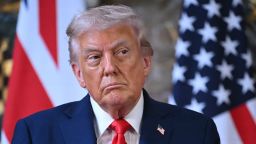Trump’s UK Visit: Pomp, Promises, and Economic Doubts

During his recent state visit, Donald Trump was met with lavish ceremonies and formalities in the United Kingdom, but the anticipated benefits for the British government remain uncertain. In his banquet speech, Trump declared the relationship between the United States and Britain as “unbreakable.” However, many in the UK government were concerned that any misstep could jeopardize this “special relationship,” particularly as it coincided with a challenging period for Prime Minister Keir Starmer.
Starmer faced his own political challenges leading up to the visit, notably firing Peter Mandelson as the UK ambassador to Washington amid revelations about Mandelson’s connections to convicted sex offender Jeffrey Epstein. This dismissal was part of Starmer’s effort to distance his administration from controversies while ensuring that Trump’s visit proceeded smoothly. Activists attempting to highlight Trump’s ties to Epstein were arrested for projecting images onto Windsor Castle, illustrating the lengths the government went to avoid any disruptions.
Despite the pomp and circumstance surrounding Trump’s visit, the economic promises made during discussions have raised eyebrows. The British government touted a significant investment package worth £150 billion (approximately $203 billion) from US companies, dubbed the “Tech Prosperity Deal.” This includes £31 billion from major US tech firms aimed at enhancing the UK’s AI and tech infrastructure, while the majority, £90 billion, will come from private equity firm Blackstone over the next decade. The government anticipates this investment will create around 7,600 jobs.
However, skepticism remains regarding the actual impact of these investments. Many of the details had been announced previously, leading some analysts to question whether these commitments represent new economic momentum or simply a rebranding of existing plans. “There are big question marks about some of the details of these deals,” stated Olivia O’Sullivan, director of the UK in the World program at Chatham House. Former Deputy Prime Minister Nick Clegg echoed these concerns, characterizing the tech agreement as “sloppy seconds from Silicon Valley.”
A critical component of building the proposed AI infrastructure involves increasing Britain’s energy supply. Trump has previously criticized the UK for its plans to halt new domestic oil and gas drilling, which could impact the energy needs of future AI data centers. Nonetheless, both nations found common ground on nuclear energy, signing a deal to streamline the construction of nuclear power stations in the UK and the US.
While the long-term economic benefits of these agreements are uncertain, immediate challenges persist. The UK economy remains in a precarious state, with the anticipated benefits yet to materialize. Although Trump’s 10% tariff on British goods is less than the tariffs imposed on the European Union, the UK had hoped for a reduction or elimination of the 25% tariff on steel exports to the US. This hope has been dashed, further straining the UK’s steel industry, which recently saw its third-largest steelworks fall under government control.
On the foreign policy front, Starmer managed to sidestep significant disputes during Trump’s visit. Trump expressed disagreement with the UK’s impending recognition of a Palestinian state but did not aggressively criticize Starmer. However, the Prime Minister did not secure any new commitments from Trump regarding foreign policy, including pressures on Russian President Vladimir Putin concerning the ongoing conflict in Ukraine.
Beyond immediate diplomatic discussions, Trump’s visit has further entrenched elements of his political style within the UK. Nigel Farage, leader of the Reform UK party, is capitalizing on Trump’s popularity and is currently polling ahead of Starmer’s Labour party, promising to “Make Britain Great Again.” His rhetoric on immigration and other issues may embolden the hard-right opposition in Britain.
While Starmer may have successfully navigated a contentious visit without incident, the ultimate question remains: Did Britain gain any substantial commitments from Trump that could translate into meaningful economic or foreign policy advancements? For now, many in the UK may feel they have received little in return for the grand displays of diplomacy and ceremony.






